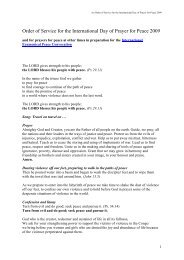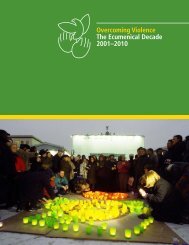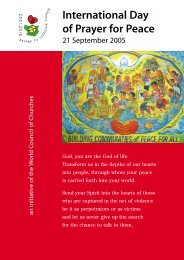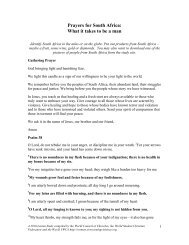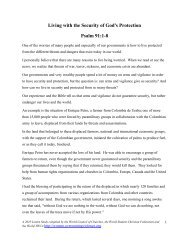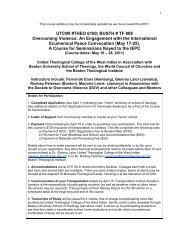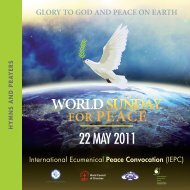Alternative Globalization Addressing Peoples and Earth
Alternative Globalization Addressing Peoples and Earth
Alternative Globalization Addressing Peoples and Earth
You also want an ePaper? Increase the reach of your titles
YUMPU automatically turns print PDFs into web optimized ePapers that Google loves.
54<br />
rights – this is for the UN to h<strong>and</strong>le. They believe that their work<br />
contributes to human rights in the sphere of economic development<br />
<strong>and</strong> related social policies, thereby complementing the work of the UN.<br />
They maintain that growth <strong>and</strong> markets will reduce poverty.<br />
In order to address the specific impact of Bretton Woods policies on the<br />
ground, four case studies will be conducted as the basis for further work.<br />
It is imperative to continue putting pressure on these international<br />
financial institutions, which are the main actors in the project of<br />
economic globalization.<br />
6.3. The WCC/APRODEV study on Christianity, wealth<br />
<strong>and</strong> poverty: the findings of ‘Project 21’, 2003:<br />
APRODEV-WCC-related agencies in Europe <strong>and</strong> WCC have been<br />
engaged in a study on “Poverty <strong>and</strong> wealth” based on case studies in 24<br />
countries. It concluded that<br />
“Poverty is still a major global reality. It has many dimensions - material,<br />
social <strong>and</strong> psychological - <strong>and</strong> many side effects. It is characterized above<br />
all by a lack of income <strong>and</strong> power. Wealth is the reverse of poverty, <strong>and</strong><br />
is just as great a problem unless <strong>and</strong> until it is shared by everyone <strong>and</strong> is<br />
based on moral, social <strong>and</strong> spiritual values.” 28<br />
In this study, it is noted that<br />
“Excessive wealth is contrary to gospel teachings. It cannot be separated<br />
from poverty. They have common causes <strong>and</strong> integral related<br />
characteristics: the ability of the rich to earn a living, for example, is<br />
the inability of the poor; the strength of the rich is the weakness of the<br />
poor. Worse still, excessive wealth is itself the cause of poverty. The<br />
drive to create a rising tide of wealth <strong>and</strong> become rich does not benefit<br />
the poor <strong>and</strong> the rich alike. It does not bring an end to poverty but<br />
often exacerbates it. And by concentrating only on poverty, attention<br />
is deflected from the rich. At most, they are seen as possible source to<br />
solve poverty. They are not seen as a major part of the problem.”<br />
A culture in which greed <strong>and</strong> endless accumulation of material possessions<br />
are regarded as normal <strong>and</strong> legitimate has to be eroded by alternative<br />
values such as self-restraint, simplicity, a sense of proportion, justice,<br />
generosity, volunteerism (a “giving culture”), holism <strong>and</strong> greater<br />
discernment as to “means” <strong>and</strong> “ends”. Major questions were raised:<br />
28<br />
Michael Taylor, Christianity, poverty <strong>and</strong> wealth: the findings, ‘Project 21’, WCC<br />
Publications, Geneva 2003, p.1.




